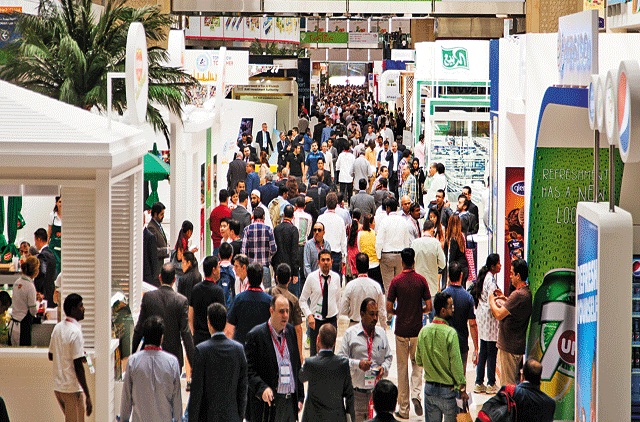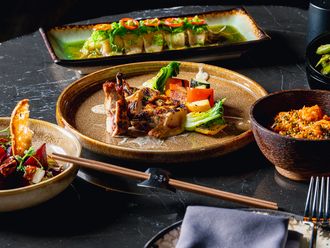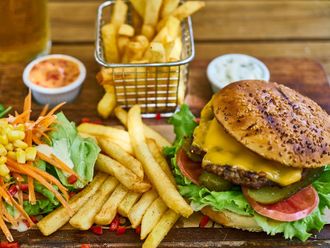Gulfood marks its 19th edition at a time when food imports and security are appearing as the biggest issues. The show begins today at the Dubai World Trade Centre and will continue until Thursday. Gulfood, which was launched 27 years ago is now the world’s biggest event of its kind, with over one million square feet of floor space and 4,500 exhibitors, with more than 80,000 visitors expected.
“The record participation comes as Dubai’s position as the regional hub for hospitality, trade and tourism has been accelerated by the emirate’s confirmed hosting of the World Expo in 2020, which will fuel market growth opportunities for the global foodservices industry,” says Mark Napier, Exhibition Director, Gulfood, in an email interview.
Strong participation
A total of 120 national pavilions are confirmed for the event. Ten new countries will be participating this year, including Bahrain, the Basque County, Colombia, the Czech Republic, Georgia, Saudi Arabia, Mexico, Qatar, Romania and Vietnam. In total, 1,447 show debutants will participate at Gulfood 2014.
Dubai’s strategic position as a recognised gateway between East and West and the re-export hub into the other regional countries — specifically Africa, the Far East and the sub-continent — adds to the appeal of the trade-only show, says Napier. “At present, more than 50 per cent of food imported by the UAE is re-exported, while GCC food imports are forecast to reach $53.1 billion (about Dh195 billion) by 2020 according to a report by the Economist Intelligence Unit. The hospitality and tourism sector remains a bright spot across the GCC,” he says.
Under the theme International Flavours, World-Class Business, this year’s show will present several new features that concentrate on the latest trends and global issues. A variety of international foods will be on show at the event, from prepackaged finished dishes to unusual ingredients. International chefs will prepare signature national dishes in live animation theatres within their national pavilions. A new Finished Food Market emphasis reflects the significant regional business potential for global food and beverage-related businesses.
Other events at the show include the World Food Security Summit that will bring together more than 300 stakeholders in the food and agriculture sectors and the International Halal Conference, a sector of increasing importance for the global food and beverage industry. The Speciality Coffee Association of Europe (SCAE) will be running a Brew Bar where world-class baristas offer exclusive tastings of speciality coffees. The SCAE will also organise demonstrations and presentations on hot issues.
Gulfood 2014 also marks the fifth edition of the Gulfood Awards. Judged by an international panel of independent industry experts, the awards will reward people and companies in eight key categories and 22 sub-categories this year.
In addition, an Export Advice Clinic will see key government, industry, trade authorities and market analysts offer tips on legal issues, logistics challenges, regulations, and more.
From a business perspective, Saudi Arabia represents the largest opportunity for exhibitors within the GCC. “Saudi Arabia with 65 per cent of the total GCC population, is the largest food consumer in the GCC region, which, correlated with the reduced domestic production capacity, translates in the kingdom becoming one of the most lucrative markets in the industry,” says Napier.
Important markets
A key market for imports and exports, Saudi Arabia’s food sector is witnessing annual growth of 18.5 per cent and due to its rising population and economic growth, consumption in the kingdom is expected to grow 55.3 per cent within the next four years, to reach $70 billion per year.
“Gulfood is an important platform for Saudi Arabian companies who are looking for trading partners both in the region and globally. We anticipate a busy and productive week of business trading and relationship building,” says Ahmed Alhakbani, Secretary General, Saudi Exports Development Authority.
According to a report on the GCC food industry by Alpen Capital, Saudi Arabia accounted for 62 per cent of the total GCC food consumption in 2010, followed by UAE (20 per cent), Oman (7.1 per cent), Kuwait (5.9 per cent), Qatar (3.7 per cent) and Bahrain (1.3 per cent).
“However, in terms of per capita food consumption, the UAE leads the GCC nations with per capita food consumption. This is primarily due to the fact that the UAE has the highest inflow of tourists among all GCC nations, as well as having lower income disparity,” says Napier.
He also highlights Qatar’s importance. With the highest per capita income in the GCC, Qatar’s hosting of the 2022 Fifa World Cup is likely to boost tourism and food and beverage activity in the country.
Exploring Ecuador
Pro Ecuador, the trade and investment promotion organisation of Ecuador, in association with the Dubai Department of Economic Development, is bringing together over 100 local, regional and international companies and traders to meet with Ecuadorian F&B producers at Gulfood.
UAE companies are actively exploring Ecuador as a key trading partner to import non-oil products. Participation at Gulfood will offer networking opportunities thus advancing trade relations with new markets in Latin America, which further help in strengthening its presence in the region.
Pro Ecuador is aiming to achieve 31 per cent increase of its non-oil exports in 2014. Currently, the total value of Ecuador’s non-oil exports in 2013, excluding the fourth quarter, is $3.65 billion.
Canada’s participation
For another edition, Canada will have a pavilion at Gulfood, with a participation of 43 Canadian food and beverages exporters, an increase of 26 per cent from last year. Canadian exhibitors will showcase and promote various products from East to West of the country, such as dairy products, confectionary, beef, veal, snacks, bakery products, beverages, vegetables and fruits.
Canada is a well-known food exporting nation with its diverse climate and abundant land and water resources. Food trade between Canada and UAE has been increasing regularly over the years with Canadian agri-food exports to the UAE amounting to CAD$520 million in 2012. In fact UAE is the number one Canadian agri-food export market, largest in the Middle East North Africa region.
“UAE nationals love quality taste and excellence, all attributes that Canada and its food and ingredients are known far and wide," says Nawal Benzaid, Regional Agrifood Counsellor. “For example, Canadian beef and seafood are in high demand by elite chefs and gourmet retailers in the UAE, Canadian pulses and vegetables also remain in high demand, a trend reflected globally. Consumers trust food imported from Canada, they instinctively know Canadian products are gown and produced in a safe, wide open and clean environment.”
Gulfood to throw spotlight on food security and imports
Gulfood attracts record participation as Dubai’s Expo 2020 win fuels market growth opportunities







